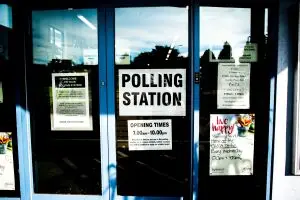24 per cent of the UK population are disabled[1] yet public transport is frequently described as ‘difficult’ and ‘inaccessible’ by disabled passengers[2]. The Government has set out how it aims to improve this, most notably through the Inclusive Transport Strategy (2018)[3] and the National Disability strategy (2021)[4]. Below, Brevia analyses the most frequent issues surrounding access in public transportation and the associated political debates and policies.
Rail
Recent surveys show 93 per cent of disabled people find it difficult to travel by train[5]. To improve the experiences of disabled people using the railway, the Access for All programme was launched in 2006[6]. This has improved the number of journeys through step free stations (three quarters, compared to half in 2005) but has not done as much to improve the prevalence of step free access between all platforms (only one in five stations currently have this). There is currently no legally binding end date by which this must be improved.
The Williams-Shapps plan for rail was published in 2021[7], which intends to improve these issues by developing and implementing a new national accessibility strategy for the railways and placing a statutory duty on Great British Railways to improve accessibility. There is also ongoing work to ensure all stations have tactile paving to improve safety for visually impaired individuals.
Disability Rights UK state that disabled passengers are also being impacted by understaffed stations. They highlight the high number of failed passenger assistance bookings, lack of assistance within stations due to low numbers of support staff and an over reliance on smart technology when requesting accessibility information and booking assistance[8].
Bus
89 per cent of disabled people found bus travel difficult[9]. While 99 per cent of buses meet the minimum requirements for accessibility, only 30 per cent of buses in England outside London provide the audio-visual information that is vital for visual and hearing-impaired users.
Accessible Information Regulations (AIR)[10]were introduced this year. These will require the majority of vehicles running local bus services to have audio-visual information about route, destination and upcoming stop information by October 2026[11]. Labour plans to boost investment into bus services, and in 2019 had plans to ensure all new buses had audio-visual information[12].
How might policy change?
The past decades have brought huge legislative and societal improvements regarding equal access for disabled people, but campaign groups argue there is still a long way to go.[13]
There is increasing investment into rail and bus companies to improve accessibility, primarily by improving the infrastructure. However, the push for more ticket machines and automated and online services is reportedly having a disproportionately negative impact on some disabled users. Up to 40 per cent of older disabled people find smartphones and ATMs inaccessible.[14] In October 2023, the Government announced it would scrap plans for rail ticket office closures in England in response to a public backlash that these plans would make travelling more difficult for disabled passengers.[15]
The Draft Rail Reform Bill introduces specific duties in relation to accessibility with the aim of enhancing the experience for disabled passengers.[16] The Transport Committee is conducting pre-legislative scrutiny of the draft Rail Reform Bill and will report its conclusions and recommendations, to which the Government will respond. Labour has committed to making public transport more accessible and more details are expected in its manifesto. Organisations seeking to influence disabled access policy should capitalise on this key piece of legislation and election developments to advance their positions.
Author: Belle Crisp
Belle specialises in disability design and related policy. She has a Masters in Disability Design and Innovation from UCL, in which she focussed on disability design policy and its real-world outcomes through close work with disabled people.
BREVIA CONSULTING PROVIDES STRAIGHTFORWARD POLITICAL ADVICE AND SUPPORT TO BUSINESSES AND ORGANISATIONS
Discover how Brevia can help you and your organisation by contacting the Brevia Team on 020 7091 1650 or contact@brevia.co.uk
Notes
[1] House of Commons Library, UK disability statistics: Prevalence and life experiences, 23 August 2023, link
[2] Innovate UK, Accessible and Inclusive Transport, March 2023, link
[3] Department for Transport, The Inclusive Transport Strategy: Achieving Equal Access for Disabled People, 3 November 2020, link
[4] HM Government, National Disability Strategy, July 2021, link
[5] Innovate UK, Accessible and Inclusive Transport, March 2023, link
[6] Department for Transport and Network Rail, Access for all: Funding to Improve Accessibility at Rail Stations, 8 July 2019, link
[7] Department for Transport, Great British Railways: Williams-Shapps plan for rail, 20 May 2021, link
[8] Disability Rights UK, Government Policies on Rail Travel to Seriously Disadvantage Disabled People, 12 May 2023, link
[9] Innovate UK, Accessible and Inclusive Transport, March 2023, link
[10] HM Government, The Public Service Vehicles (Accessible Information) Regulations 2023, link
[11] Department for Transport, Rights of Disabled Passengers on Transport, 23 November 2022, link
[12] Labour Party, Breaking Down Barriers– Labour’s Manifesto for Disabled People, link
[13] Motability Foundation, The Transport Accessibility Gap, March 2022, link
[14] Disability Rights UK, link
[15] The Guardian, 31 October 2023, link
[16] Department for Transport, Impact Assessment supporting the draft Rail Reform Bill, 20 February 2024, link




